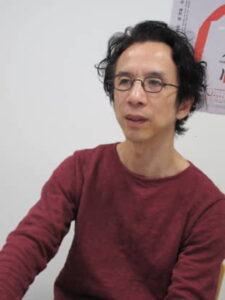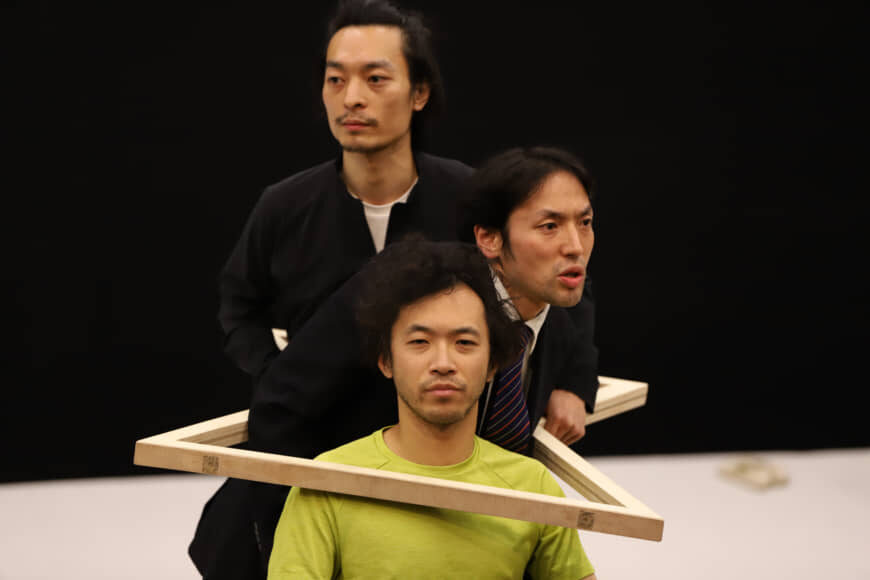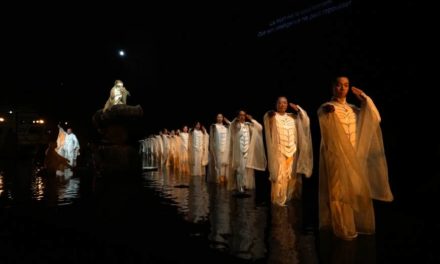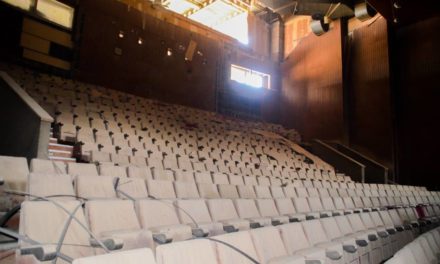Shuntaro Matsubara’s first contact with live theatre was in 2014, when he saw a production of German dramatist Bertolt Brecht’s 1930 play Fatzer (aka Downfall of the Egotist Johann Fatzer) at the Kyoto studio of renowned director Motoi Miura, and his avant-garde company Chiten
Only 26 years old at the time, and a little-known author of several novels, Matsubara was impressed enough to join a drama circle run by Miura. Before long, the pair began to develop a creative partnership together.
The first fruit of Matsubara’s new inspiration arrived shortly after. In 2015, his debut work as a playwright — a piece titled Michiyuki (Travel Scene) that alluded to the March 2011 disasters in northeastern Japan, unexpectedly won the coveted annual Aichi Arts Foundation Drama Award for new scripts, which has been a springboard for many young playwrights’ careers.
For his prize, the foundation invited Matsubara to present his play in Nagoya — which he did, with Miura as its director. Following this, Miura asked Matsubara to write a piece for his Chiten company to stage at Kanagawa Arts Theatre (KAAT), an influential public venue in Yokohama. The result was Wasureru Nihonjin (The Japanese, Who Forget), a powerful critique of many Japanese people’s tendency to act and think as directed by those in authority. Continuing their collaboration, Matsubara and Miura worked with Chiten’s actors to stage the newcomer’s Yamayama (which translates as Mountains) at KAAT in June 2018 — subsequently winning the Kishida Kunio Drama Award for 2019.
Many theatergoers have welcomed Matsubara’s arrival, and the critics and drama professionals have been impressed by his unique approach. Perhaps best described as a non-narrative postmodern style lacking in any overall storyline, his work features unrelated characters making provocative statements that often relate to Japanese social and political current affairs, with lines such as “Our time shorted out like electric wires in the Showa Era.”
Many observers, though, have questioned whether Matsubara could be as successful with any other director besides Miura, who has rendered his typically long and winding passages into the consistently appetizing fare. Now, that question is about to be answered, as the leading stage and TV actor, Tomohiko Imai, becomes the only other dramatist to direct a play by Matsubara — his latest work, Memorial. Additionally, venturing into the, and far from the avant-garde environs of Chiten, Memorial will be staged by the mainstream Bungakuza Atelier theater in Tokyo (Imai’s home base, which dates from 1937), one of Japan’s best-known art institutions.
“I saw Wasureru Nihonjin at KAAT about two years ago, and though I wouldn’t say I understood it clearly, I recognized great possibilities in such obscurity,” Imai says about his first contact with Matsubara’s world. “I read the original text and found it was very different from Chiten’s version adapted for the stage. And actually, I was shocked afresh by how great Matsubara’s writing was. At the Bungakuza, we normally don’t change the text from the original, so I was immediately excited to imagine what Memorial would be like if we staged it in our style” He adds.

Stage Director Tomohiko Imai of Shuntaro Matsubara’s Memorial at the Bungakuza Atelier theater in Tokyo, 2019. Photo Credit Nobuko Tanaka
Although Imai, 52, has appeared in almost 100 plays, Memorial is only his eighth venture into directing. Hence, it is hardly surprising when he says a big part of what attracted him to this play was with an actor’s perspective, he was curious how best to deliver Matsubara’s “nonauthentic drama.” “There just aren’t any clues or stage instructions about how to portray the characters — and these are vital parts of any script for conventional plays,” Imai says. “Consequently, I believe the actors are key to presenting the playwright’s world. It will be important that they say the words properly to convincingly express his complicated but heartfelt lines strongly, whether they’re based on reality or not.” Imai says he is up for the challenge of handling the actors and their open-ended dialogue. “Of course, I oversee the performance, including the music and visuals, but the crucial point will be how I, as director, work with the actors to bring the play to life in our dramatization on stage.
In Memorial, which has no backstories explaining why anything happens, Matsubara uses a conversational style of dialogue among people who meet each other unexpectedly. Many actors also play multiple roles as characters from different backgrounds. Whoever they are, though, and however they meet, the characters soon start sharing their daily problems and difficulties, sometimes also expressing bitter ironies, through lines such as, “You would kill people if America ordered you to do so, wouldn’t you?”. Yet while it appears each character is freely voicing his or her own opinion, Imai says the play has a powerful, unified tone despite its disparate threads. “We are repeating scenes by trial and error in rehearsal,” he says. “And despite all my experience as an actor, I’ve never spent so much time thinking about theater itself, the meaning of acting, or the roles of audiences.” Reflecting further on this staging, the Bungakuza veteran continues, “I understand today’s commercial market mechanism. It’s great that many people enjoy pure entertainment programs, and I sometimes perform in them. However, I believe we need to protect experimentally and abstruse plays like Memorial, although I presume some in the audience will say they don’t understand it, or it didn’t move them. Even so, I think some questions will remain in their minds that they will think about afterward,” Imai says. “It’s for this reason that I’m convinced of the long-term utility of theatre.”
Also, referring to audiences at Bungakuza’s 200-seat Atelie theatre space where Memorial is being staged, Imai says, “Many of our loyal customers are quite elderly, so I must strike the right balance between presenting a naturalistic drama they enjoy and stimulating them with a bit of an experimental approach.” To that end, Imai and the actors are still discussing, scene by scene, how to deliver the lines. But while declaring that it would be “boring” to arrive at a result easily, he laughs as he adds, “We are enjoying this voyage, even though we don’t know our destination”.
Imai says that working with this play’s actors and creators is very different from the things he has done before. “This is thrilling because its many unknown possibilities are making me think in different ways,” he says. “So, to reward Bungakuza’s flexibility in staging Memorial, even though it wasn’t written when I proposed it, I hope our audiences will be delighted by this exciting initiative as well.”
Memorial runs from December 3rd to 15th at the Bungakuza Atelier Theatre in Tokyo’s Shinjuku Ward. For more info click here.
This article was originally posted at Japantimes.co on November 28th, 2019 and has been reposted with permission. To read the original article, click here.
This post was written by the author in their personal capacity.The opinions expressed in this article are the author’s own and do not reflect the view of The Theatre Times, their staff or collaborators.
This post was written by Nobuko Tanaka.
The views expressed here belong to the author and do not necessarily reflect our views and opinions.


















